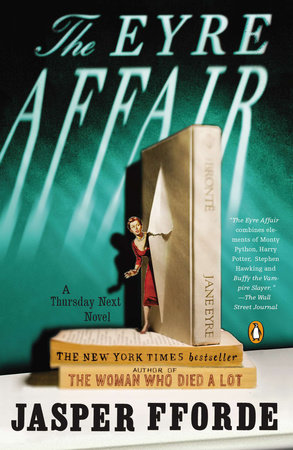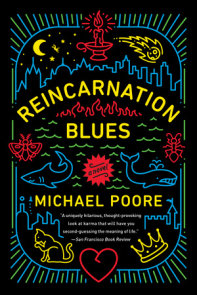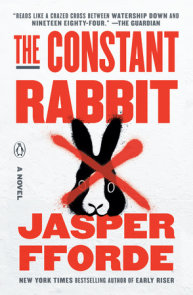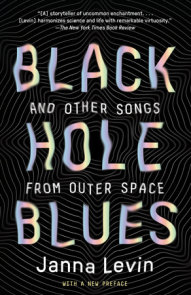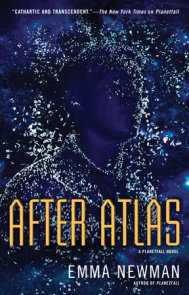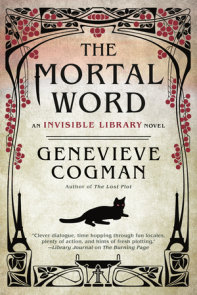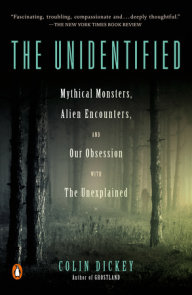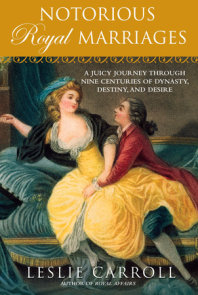READERS GUIDE
Questions and Topics for Discussion
INTRODUCTION TO THE EYRE AFFAIR
Masterpiece Theatre meets James Bond in The Eyre Affair, the first novel in Jasper Fforde’s cheeky sleuth series featuring a book-loving, gun-toting, wit-slinging heroine named Thursday Next. In Thursday’s world, an alternate version of 1985 London, literature rules popular culture—audiences enact and participate in Richard III for Friday-night fun, thousands of visitors make literary pilgrimages to gawk at original manuscripts, and missionaries travel door-to-door heralding Francis Bacon as the true Bard.
The mysterious theft of the Martin Chuzzlewit original manuscript from the Dickens Museum catalyzes Thursday’s transformation from humble library cop into intrepid literature savior. When Thursday’s eccentric uncle Mycroft and aunt Polly are kidnapped along with their Prose Portal, an ingenious device that allows readers to physically enter the world of any book, the SpecOps literary division uncovers a dastardly plot to kidnap and murder characters from everyone’s favorite novels. The criminal operation is helmed by Acheron Hades, the third most evil man in the world, a supreme villain who bends minds, shifts shapes, and remains impervious to most mortal weapons. Thursday and her SpecOps cohorts’ mission to capture their slippery adversary is further complicated by the meddling of the pointedly named Jack Schitt, the despotic head of security at the hegemonic Goliath Corporation, whose investment in Hades’ capture seems suspect. And when the perpetrators dare to steal the original Jane Eyre, Thursday must race to save one of the most beloved characters in English literature—and Brontë’s classic love story itself—from eradication.
ABOUT JASPER FFORDE
Jasper Fforde is the author of The Eyre Affair, Lost in a Good Book, (both from Penguin) and The Well of Lost Plots (Viking), the first three books in the Thursday Next fantasy/detective series. He lives in Wales
A CONVERSATION WITH JASPER FFORDE
Thursday Next seems to be descended from a long line of British crime stoppers like Sherlock Holmes and James Bond, and her name is a clear homage to G. K. Chesterton’s classic The Man Who Was Thursday. Who are your favorite fictional detectives and how, if at all, did they shape Thursday Next?
Actually, the name wasn’t drawn from Chesterton at all; neither, as a reader suggested, from Paris’s line in Romeo and Juliet:
Paris: What may be must be this Thursday next.
Juliet: What must be must be.
Friar Lawrence: Now there’s a certain text.
Much as I would like to claim either as the truth, sadly not. The real influence was much closer to home and infinitely more mundane. My mother used to refer to days in the future in this manner: “Wednesday week, Tuesday next,” etc., and I just liked the “tum-te-tum” internal rhythm of “Thursday Next.” It intrigued me, too. What kind of woman would have a name like this? I’m not sure which detective Thursday is drawn from—perhaps all of them. My favorite detective was always Miss Marple, and perhaps Thursday has Jane’s strict adherence to duty and the truth. There is undeniably a bit of James Bond, Sam Spade, and Richard Hannay about her, although as character models I have always drawn on women aviators from the golden age of aviation, as these extraordinary characters (Bennett, Earhart, Markham, Coleman, Johnson) had not just a great passion and zest for life and adventure but also an overriding sense of purpose. In a word, Spirit.
You worked in the film industry for nineteen years before becoming a full-time writer. In our society, film is a more popular and lucrative medium than books, but in Thursday’s world, the novel is king. Having had a finger in each pie, would you prefer to live in Thursday’s world or ours? Did your work in film affect the narrative of the novel?
I think I’d prefer to live in Thursday’s world—and I do, six months a year when I’m writing the books. Mind you, if I were a writer in Thursday’s world I’d be writing about a heroine who doesn’t do extraordinary things at all and lives in a UK where not much happens. And when I was asked in THAT world which world I’d prefer to be in, I’d say… Oh, lawks, we’ve entered a sort of Nextian “closed-loop perpetual opposing answer paradox.” Better go to the next question. Yes, film did most definitely affect the narrative. Because I have been educated in film grammar, I tend to see the books as visual stories first and foremost, and describe the story as I see it unfolding. That isn’t to say I don’t play a lot with book grammar, too, but I can’t shrug off my visual origins. Mind you, I would contend that reading is a far more visual medium than film, as the readers have to generate all of the images themselves; all I do is offer up a few mnemonic signposts. I am always astounded by the number of readers who can describe the Nextian world in profound detail—perhaps this is the reason why movies-from-books tend to be such a huge disappointment.
What are your favorite classic novels?
Jane Eyre was probably my favorite of that type of “literary” classic. Dickens is great fun, too, although to be honest I still prefer Carroll’s Alice in Wonderland for its high-quality nonsense virtuosity and Jerome’s Three Men in a Boat for its warmth, observation, and humor. Both were written in Victorian times and are classics—just a different sort. Swift’s Gulliver’s Travelsis another firm favorite, as is Grossmith’s Diary of a Nobody.
Why did you choose Jane Eyre for Thursday’s first jump into literature?
Three reasons. First, it’s a great book. The characters of Jane Eyre, Rochester, Mrs. Fairfax, Grace Poole, Bertha, and Pilot the dog are all great fun to subvert in the name of Nextian entertainment. Second, it is well known, even 150 years after publication. For The Eyre Affair to have any resonance the featured novel had to be familiar and respected. If potential readers of my book haven’t read Jane Eyre they might have seen the film, and if they haven’t done either, they might still know that Jane is a heroine of Victorian romantic fiction. I don’t know of many other books that can do this. Third, it’s in the public domain. I could do pretty much what I want and not have to worry about copyright problems—given the premise of the novel, something that had to remain a consideration!
Your novels have been described as a sort of Harry Potter series for adults. Why do you think fantasy and magic tales are enjoying so much popularity right now? Why do adults find the stories so satisfying?
I’m not really sure why fantasy is popular right now, but the tastes and moods of the book-reading public do tend to move around, so in a few years we might all be reading “Squid Action/Adventure” or “Western Accountancy,” so who knows. Mind you, I’ve never been one to make such a huge distinction between children and adults—I have remained consistently suspicious of people who describe themselves as “adults” from a very early age. We all enjoy stories—it is a linking factor between all humans everywhere, that strange and uncontrollable urge to ask, “Yes, but what happens next?” Perhaps fantasy offers imaginative escapism more than other genres. I was very happy when I learned that Harry Potter was being sold in “plain covers” in the UK so adults could read it on the train without feeling embarrassed. “Ah,” thinks I, “there is hope yet!”
The Tie-seller in Victoria says, “There are two schools of thought about the resilience of time. The first is that time is highly volatile, with every small event altering the possible outcome of the earth’s future. The other view is that time is rigid, and no matter how hard you try, it will always spring back toward a determined present.” Which do you think is more likely?
From a narrative point of view, the notion of time somehow wanting to keep on a predetermined course is far preferable. It makes the ChronoGuard’s job that much harder. It’s not easy to change things, as Colonel Next often finds out. Personally, I think time is highly volatile—and out there for us to change, if we so wish it. Most of the time we don’t. Our notions of self-determination are, on the whole, something of a myth. We are governed almost exclusively by our own peculiar habits, which makes those who rail against them that much more remarkable.
If time travel were a reality, do you think it would be possible for people to visit other eras responsibly?
Of course not! When have humans ever behaved responsibly? That’s not to say I wouldn’t be first in the queue, but mankind is far too flawed to resist wanting to use this new technology to deal with other problems, such as radioactive waste disposal or something. Given mankind’s record so far, it wouldn’t be long before the criminal gangs moved in to steal items from the past to sell in the future. The ChronoGuard refer to this sort of crime as “Retrosnatch,” although the upside of this is that you can always catch the person red-handed after the event. Before the event. During the event.
If you could travel in time, when would you want to visit and why?
Good question! The choice is endless. Since I’m a fan of nineteenth-century history, one of the times I would visit would be during a conversation that took place between Nelson and Wellington in September 1805. It was the only time these two historical giants met. Failing that, the day Isambard Kingdom Brunel launched his gargantuan steamship the Great Eastern into the Thames or, further back still, 65 million years ago when an asteroid hit the earth—must have been quite a light show. Closer to home, I suppose I’d like to revisit the first time I learned to ride a bicycle without stabilizers—a more joyous feeling of fulfillment, freedom, and attainment could only be equaled by the time one learns to walk or read.
Acheron Hades may be the third most evil man on earth, but he’s also a charming, seductive adversary with some of the best lines in the book. If Acheron Hades is only the third most evil man on earth, who are second and first, and will Thursday get to face them?
The “third most evil man” device was to hint at a far bigger world beyond the covers of the book. Since I made this rash claim many people have asked the same question, and I can reveal that the Hades family comprises five boys—Acheron, Styx, Phlegethon, Cocytus, and Lethe—and the only girl, Aornis. Described once by Vlad the Impaler as “unspeakably repellent,” the Hades family drew strength from deviancy and committing every sort of debased horror that they could—some with panache, some with halfhearted seriousness, others with a sort of relaxed insouciance about the whole thing. Lethe, the “white sheep” of the family, was hardly cruel at all—but the others more than made up for him.
Acheron Hades isn’t the only personification of evil in your novels. Just as evil, and much more insidious, is the English government’s indentured servitude to the Goliath Corporation and Goliath’s willingness to sacrifice human lives for wartime financial gain. Why did you choose a corporation as the other major villain in the story? Do you think a relationship like the one between England’s government and the Goliath Corporation could exist in real life?
I like the Orwellian feel of Goliath—oppressive and menacing in the background. As a satirical tool, its use is boundless. I can highlight the daftness of corporations and governments quite easily within its boundaries. Goliath is insidious, but what I like about it most is that it is entirely shameless in what it does—and that no one in Thursday’s world (except perhaps Thursday herself) seems to think there is anything wrong with it. Perhaps the fun with Goliath is not just about corporations per se, but how we react to them.
The Eyre Affair, Lost in a Good Book, and The Well of Lost Plots have all been great successes, and I’m sure your fans will make a success of their follow-up, Something Rotten. If you could retire now and live in any book, which book would you like to spend the rest of your days living in?
An all-book pass to the P. G. Wodehouse series would be admirable. Afternoon teas, a succession of dotty aunts, impostors at Blandings Castle—what could be better or more amusing?
DISCUSSION QUESTIONS
- If you could jump right into any novel with Ms. Nakajima, which novel would you choose to visit? What classic novel endings have left you unsatisfied? What endings would you change if you had the power to do so?
- Acheron Hades claims that pure evil is as rare as pure good. Do you think either exists in our world?
- Two of the main plot devices—time travel and book jumping—illustrate the infinite possibilities of alternate endings. If you could travel through time, is there anything in history, either in the broad sense or in your own personal history, that you would go back and revise?
- If you could choose Ms. Nakajima’s ability to jump into novels, Thursday’s father’s ability to travel through time, or Acheron Hades’ ability to defy mortality, which power would you choose to have and why?
- Despite the fact that he is her one true love, Thursday holds a grudge against Landen Parke-Laine for over ten years because he betrayed her brother when they returned from the Crimean War. Whom do you think Thursday’s first allegiance should have been to, her lover or her brother? Do you think her decision to return to Landen comes out of weakness or strength?
- In the hands of villains like Jack Schitt and Acheron Hades, the Prose Portal could be exploited for villainous deeds, but it could also have been used to do good deeds such as producing a cure for terminal diseases. Would you choose to destroy the Prose Portal as Mycroft does without trying to extract good use out of it first? Do you think the risk of the destruction it could cause outweighs the possibilities for good?
- Thursday’s brother, the very Irreverend Joffy, tells her, “The first casualty of war is always truth.” Do you think this is true? Why or why not?
- Thursday says, “All my life I have felt destiny tugging at my sleeve. Few of us have any real idea what it is we are here to do and when it is that we are to do it. Every small act has a knock-on consequence that goes on to affect those about us in unseen ways. I was lucky that I had so clear a purpose.” In a world where time is so pliable, can there be such a thing as destiny? Was there a defining moment in your life when you understood what your own purpose was?
- Who is the worse villain, Acheron Hades or Jack Schitt? Which sentence do you think is worse—death by a silver bullet to the heart or an eternity trapped in Poe’s “The Raven”?







